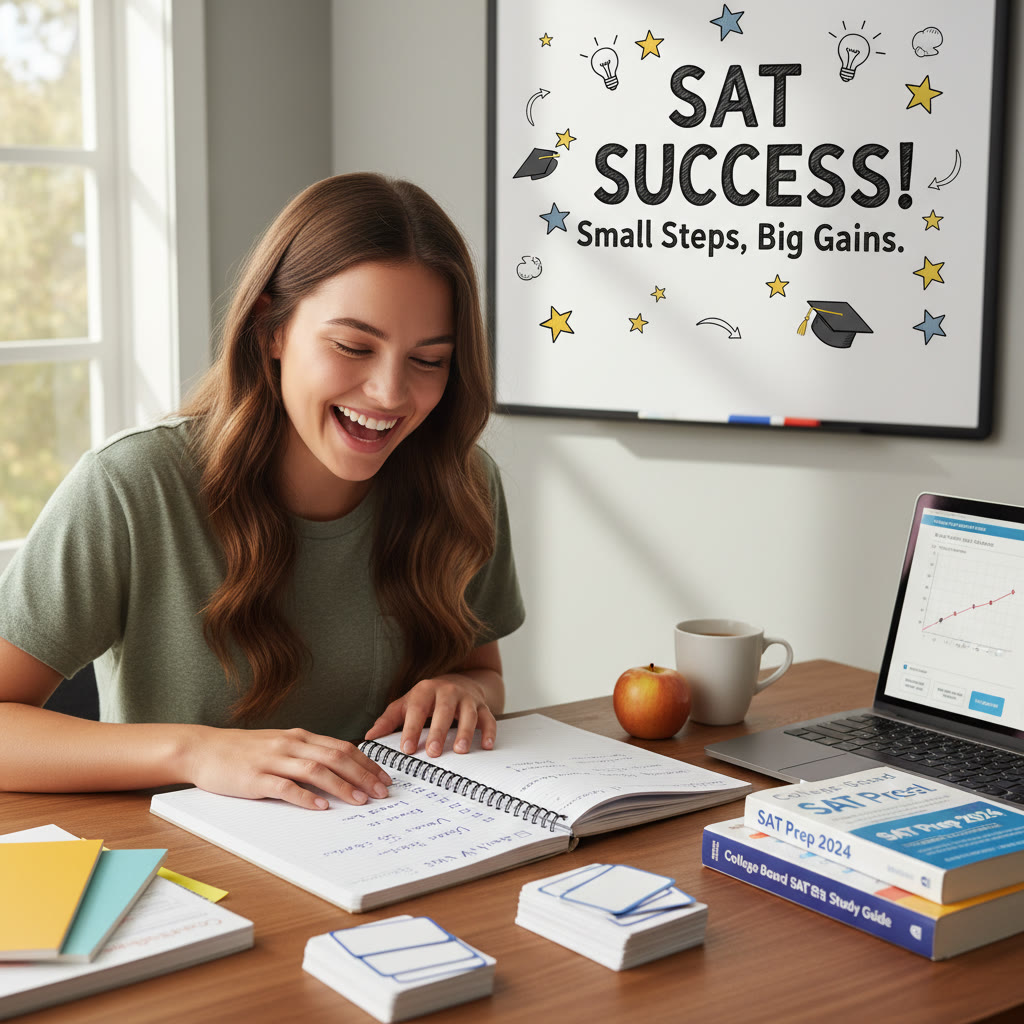Why Small Wins Matter More Than Marathon Study Sessions
When you think of SAT prep, images of late-night grinding and marathon study sessions probably come to mind. But there’s a quieter, smarter route: small wins. Small, measurable victories—finishing a focused 30-minute algebra drill, beating your previous time on a reading passage, or learning five new vocabulary words—add up. They build skill, yes, but more importantly they build confidence. Confidence is the fuel that keeps you showing up consistently; without it, even the best study plan falls apart.
Think about a time you learned to ride a bike. You didn’t take a single leap from wobbling to cruising down the block. You celebrated small milestones: staying upright for five seconds, then ten, then turning a corner. SAT prep works the same way. Each tiny victory rewires how you see yourself as a test-taker and reduces anxiety in the moment the exam matters most.
The psychology of small wins
Small wins tap into how motivation is wired. Each success triggers a little dopamine reward, nudging you to repeat the behavior. Habit researchers show that repeated small actions are more likely to stick than infrequent, intense efforts. Add a growth mindset—believing ability improves with effort—and small wins become proof that change is possible. Over time, those proofs stack into sustained progress.
But there’s a subtle difference between busy work and meaningful small wins. A win needs to be measurable and connected to a skill you can reuse on test day. A completed worksheet feels good, but beating your previous accuracy on geometry practice, or shaving 30 seconds off a reading passage while keeping comprehension steady, is the kind of win that shifts both score and confidence.
A practical framework: Turn SAT prep into a short-list of wins
Here’s a simple framework you can start using today. It’s built to produce steady momentum without burning you out.
- Pick micro-goals: tiny, clear, measurable tasks you can complete in 20–45 minutes.
- Make the goal skill-focused: each task targets one ability—timed algebra questions, passage-based inference, grammar patterns.
- Track and reflect: record performance, time, and how you felt—this turns fuzzy progress into concrete evidence.
- Celebrate briefly: mark the win, reset, and plan the next micro-goal. Small rituals reinforce progress.
- Scale gradually: when a micro-goal becomes easy, nudge it up a notch and repeat.
Micro-goals that actually work
Not all small tasks are equal. Here are examples of effective micro-goals for each SAT section:
- Math: Solve 12 mixed-algebra questions in 35 minutes with no calculators on non-calculator section strategies.
- Reading: Finish one complex passage within 22 minutes while maintaining 85% comprehension using annotation targets.
- Writing & Language: Correct 15 questions focused on punctuation rules in 20 minutes, explaining each correction aloud or in notes.
- Timing: Reduce average time per data-analysis question by 15 seconds across three practice sets.
Each goal is clear, measurable, and tied to a specific SAT skill. When you achieve it, you know the win translated into testable ability.
Designing and measuring your wins: examples and templates
Let’s make this concrete. Below is a simple 6-week progression that turns vague aims into measurable wins. The table shows week-by-week micro-goals, ways to measure success, and emotional checkpoints to monitor confidence.
| Week | Micro-goal | How to Measure | Confidence Check |
|---|---|---|---|
| 1 | Finish 3 timed algebra sets (15 min each) | Accuracy % and time per question | Rate 1–5: nervous → steady |
| 2 | Complete 4 reading passages with annotations | Comprehension score and annotation quality | Note ease of finding evidence |
| 3 | Write 2 practice essays using one template | Score using rubric and time to organize | Comfort in structure 1–5 |
| 4 | Targeted grammar drill: 30 questions | Accuracy by rule (commas, subject-verb) | Notice error types dropping |
| 5 | Full practice section with pacing strategy | Section score and pacing adherence | Confidence in finishing on time |
| 6 | Combine skills: one mixed set of 50 questions | Mixed accuracy and time management | Overall readiness 1–5 |
How to read the table and use it
The table is a template. If you’re strongest in math, swap weeks so you build more confidence early in your weaker areas, or vice versa—pick whichever route gives you momentum. The important part is consistency: small wins each week. At the end of week 6 you should have 6 clean data points showing improvement, which is fuel for your confidence and your score.
Micro-goal design by SAT section
Let’s zoom in on each section and sketch micro-goal examples you can use immediately.
Math
Math wins often look like clearing bottlenecks—certain problem types that repeatedly trip you up. Find those types with a short diagnostic, then build micro-goals around them.
- Example goal: Solve 10 linear-equation problems in 20 minutes with 90% accuracy. If you miss any, annotate the mistake and redo that problem type the next day.
- Timing tweak: Aim to reduce time from 2.5 minutes per question to 2 minutes on a problem category within three days. That 30-second cut matters on test day.
- Skill layering: After accuracy improves, add a challenge—apply the same algebra skill in a word problem format to build transfer.
Reading
Reading confidence grows when you learn to find the main idea and evidence quickly. A micro-goal might focus on one passage type at a time—science, history, or paired passages.
- Example goal: Read and annotate one science passage in 22 minutes, then answer questions with 85% accuracy. Use a two-line summary to practice capturing the main idea.
- Active reading trick: Circle transition words and underline claim sentences—this 30-second habit improves accuracy more than passive re-reading.
Writing & Language
Grammar and clarity usually respond quickly to focused drilling. Target rules that cause repeat mistakes.
- Example goal: Correct 20 questions on punctuation in 20 minutes, explaining each choice in one sentence. Explaining helps cement the rule.
- Style wins: Practice combining sentences and varying sentence openings to improve clarity and score on expression questions.
Practical exercises to generate reliable wins
Below are quick, repeatable exercises you can fold into a weekly routine. Each takes 20–45 minutes and ends with a measurable result you can track.
- Closed-book retrieval: Put your notes away and solve 10 problems from memory. This shows what’s really learned.
- Timed micro-test: Simulate test time for one passage or 15 math problems. Track time per question.
- Reflection rapid-fire: Spend five minutes writing 3 things that went well and 1 thing to try differently. This keeps your growth mindset active.
Example: A 30-minute session that guarantees a win
Try this sequence when you only have half an hour:
- 5 minutes: Quick warm-up (a couple of mental math or vocabulary flashcards).
- 20 minutes: Targeted practice (12 math problems or one reading passage timed).
- 5 minutes: Immediate reflection—record accuracy, time, and one tweak for next time.
This structure turns a short session into a visible win. Over two weeks of daily 30-minute sessions, you’ll see real improvement.
Tracking progress: simple templates and habits
Tracking is where wins become undeniable. You don’t need fancy software—just consistent recording. A one-line entry per session is enough: date, task, time, score, and a one-sentence takeaway.
Here’s a sample tracking layout you can replicate in a notebook or a spreadsheet:
- Date
- Task (e.g., “Algebra: linear equations”)
- Duration
- Result (accuracy/time)
- Confidence rating (1–5)
- Next tweak
Once you have a trail of entries, patterns emerge: persistent strengths, recurring errors, and steady confidence rises. These patterns make planning smarter and reduce the guesswork that drains motivation.
When things don’t go according to plan
Setbacks are part of the process—an honest part. A disappointing practice test or a week of low energy doesn’t mean failure; it’s feedback. How you respond matters more than the setback itself.
Reframing and rebound strategies
- Make the first response corrective, not punitive. Instead of thinking “I’m terrible at reading,” ask “What specific question types caused errors?”
- Use micro-wins to rebuild momentum. After a tough week, aim for two guaranteed wins—short, high-confidence tasks you can complete easily.
- Adjust intensity, not direction. If burnout is the issue, cut sessions from 90 to 30 minutes and increase frequency. Consistency beats intensity.
Remember: confidence is cumulative and fragile. A small victory after a setback restores it faster than a long session trying to make up lost ground.
How personalized tutoring can supercharge small wins
Working with a tutor who tailors practice to your specific patterns speeds up the small-win loop. Personalized guidance helps identify the highest-leverage micro-goals—those changes that move your score the most with the least time.
For example, with 1-on-1 guidance you can get tailored study plans that focus on your recurring mistakes, quick feedback that turns errors into lessons, and a clearer path to the next win. Sparkl’s personalized tutoring combines expert tutors with AI-driven insights to highlight which micro-goals matter most and to adapt plans as your performance changes. That kind of targeted attention turns ordinary practice into a chain of meaningful, confidence-building achievements.
Putting it all together: a sample 8-week micro-plan
Below is a more expansive plan to guide your next eight weeks. It alternates focused micro-goals with measurement weeks so you regularly see how your small wins add up.
| Week | Focus | Micro-goals | Measurement |
|---|---|---|---|
| 1 | Diagnostics & baseline | 1 full section diagnostic; note error types | Record baseline section scores |
| 2 | Targeting weaknesses | 3 focused drills on top 2 error types (20–30 min each) | Accuracy improvement per error type |
| 3 | Timing and pacing | Timed micro-tests; reduce average per-question time | Time per question and accuracy |
| 4 | Transfer | Combine skills in mixed sets; practice transitions | Mixed-set score and confidence |
| 5 | Skill deepening | Daily 30-min review: vocabulary, formulas, grammar rules | Retention checks and quick quizzes |
| 6 | Mock test week | 1 full practice test timed | Score comparison vs baseline |
| 7 | Fine-tuning | Target remaining weak spots with micro-goals | Rule-by-rule accuracy checks |
| 8 | Confidence consolidation | Short daily wins and positive rituals before test | Final practice section scores and confidence rating |
How to adapt the plan
If you find a week where progress stalls, repeat that week’s micro-goals with slight variations until the numbers move. If you have access to personalized tutoring, use those sessions to accelerate the plan: tutors can pinpoint exactly which micro-goals will yield the largest and fastest improvements.
Small rituals to keep momentum and calm nerves
Confidence isn’t only a number; it’s a feeling you cultivate with routines. Here are small rituals that support steady progress and calm test-day nerves:
- End each study session with a one-line win log. This primes your brain to notice progress.
- Practice a two-minute breathing routine before timed sections to reduce panic and steady focus.
- Create a test-day checklist and rehearse it—this reduces surprises and preserves confidence.
These small rituals reduce friction and make consistent practice more likely. The fewer decisions you make about how to study, the more energy you have to build skill.
Final thoughts: confidence is a skill you can train
Confidence in SAT prep isn’t a mysterious trait you either have or you don’t. It’s an emergent property of repeated small wins, honest tracking, and thoughtful adaptation. Start with tiny, clear goals, measure them, and celebrate them. When you do, your anxiety decreases, your focus sharpens, and your scores follow.
If you want help turning this approach into a customized plan, personalized tutoring—offering 1-on-1 guidance, tailored study plans, expert tutors, and AI-driven insights—can shorten the path to consistent wins. A coach who knows where to nudge you next makes small wins stack faster, without burning out.
So pick one tiny victory you can achieve today. Do it. Record it. Celebrate it. Tomorrow, add another. Momentum builds faster than you expect, and when it arrives, confidence will feel like a natural part of your prep. You’ll be surprised how much a string of small, steady wins can change both your score and your story.















No Comments
Leave a comment Cancel